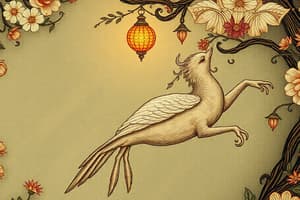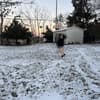Podcast
Questions and Answers
What is blank verse?
What is blank verse?
Unrhymed iambic pentameter
What is diction?
What is diction?
The choice and use of words in a poem or piece of writing
What is enjambment?
What is enjambment?
When a sentence or phrase continues from one line of poetry to the next without punctuation
What is figure?
What is figure?
Which of the following is NOT a type of figurative language?
Which of the following is NOT a type of figurative language?
Which of the following is an example of metaphor?
Which of the following is an example of metaphor?
Which of the following is an example of simile?
Which of the following is an example of simile?
Which of the following is an example of personification?
Which of the following is an example of personification?
Which of the following is an example of hyperbole?
Which of the following is an example of hyperbole?
What is synecdoche?
What is synecdoche?
What is metonymy?
What is metonymy?
What is personification?
What is personification?
What is apostrophe?
What is apostrophe?
What is hyperbole?
What is hyperbole?
Identify the figurative language used in the following extract. Justify your answer.
Identify the figurative language used in the following extract. Justify your answer.
Flashcards
Blank verse
Blank verse
A verse without rhyme, typically in iambic pentameter.
Free verse
Free verse
Poetry that does not have regular meter or rhyme.
Dirge
Dirge
A poem or song expressing lament or mourning.
Diction
Diction
Signup and view all the flashcards
Enjambment
Enjambment
Signup and view all the flashcards
Metonymy
Metonymy
Signup and view all the flashcards
Synecdoche
Synecdoche
Signup and view all the flashcards
Personification
Personification
Signup and view all the flashcards
Apostrophe
Apostrophe
Signup and view all the flashcards
Hyperbole
Hyperbole
Signup and view all the flashcards
Imagery
Imagery
Signup and view all the flashcards
Metaphor
Metaphor
Signup and view all the flashcards
Iambic pentameter
Iambic pentameter
Signup and view all the flashcards
Couplet
Couplet
Signup and view all the flashcards
Verse
Verse
Signup and view all the flashcards
Stanza
Stanza
Signup and view all the flashcards
Rhyme scheme
Rhyme scheme
Signup and view all the flashcards
Lament
Lament
Signup and view all the flashcards
Syntax
Syntax
Signup and view all the flashcards
Tree diagram
Tree diagram
Signup and view all the flashcards
Anthropomorphism
Anthropomorphism
Signup and view all the flashcards
Sensory details
Sensory details
Signup and view all the flashcards
Theme
Theme
Signup and view all the flashcards
Tone
Tone
Signup and view all the flashcards
Mood
Mood
Signup and view all the flashcards
Alliteration
Alliteration
Signup and view all the flashcards
Assonance
Assonance
Signup and view all the flashcards
Consonance
Consonance
Signup and view all the flashcards
Symbolism
Symbolism
Signup and view all the flashcards
Oxymoron
Oxymoron
Signup and view all the flashcards
Study Notes
Exercise I: Definitions
- Blank Verse: Unrhymed iambic pentameter.
- Free Verse: Poetry that does not rhyme or have a regular meter.
- Dirge: A mournful poem or song.
- Diction: Word choice in a literary work.
- Enjambment: Continuing a sentence beyond a line of poetry without punctuation.
- Metonymy: A figure of speech where the name of one thing is replaced by the name of something closely associated with it.
- Synecdoche: A figure of speech where a part is used to represent the whole, or vice versa.
- Personification: Giving human qualities to inanimate objects or ideas.
- Apostrophe: Addressing an absent person or an abstract concept as if it were present.
- Hyperbole: An exaggerated statement not meant to be taken literally.
Exercise II: Rhyme Pattern
- The provided text does not contain a complete extract to identify rhyme patterns.
Exercise III: Figurative Language
- "My little horse must think it queer": Personification - Ascribing human qualities to a horse.
- "To stop without a farmhouse near": Metaphor, simile, or personification, depending on the context.
- "The darkest evening of the year" : Imagery and Metaphor. (Evokes specific, sensory details, in this case a visual one, the depth of darkness and cold).
- "He gives his harness bells a shake": Personification, describing a horse acting as if it is human by shaking its bells.
- "To ask if there is some mistake": Personification.
- "The only other sound's the sweep/Of easy wind and downy flake": Imagery, showing the delicate sounds of nature.
- "Mum went to church": This extract is not poetic; it is a simple statement, a declarative sentence, or ordinary prose. It might be a sentence from a longer narration or story.
Studying That Suits You
Use AI to generate personalized quizzes and flashcards to suit your learning preferences.





